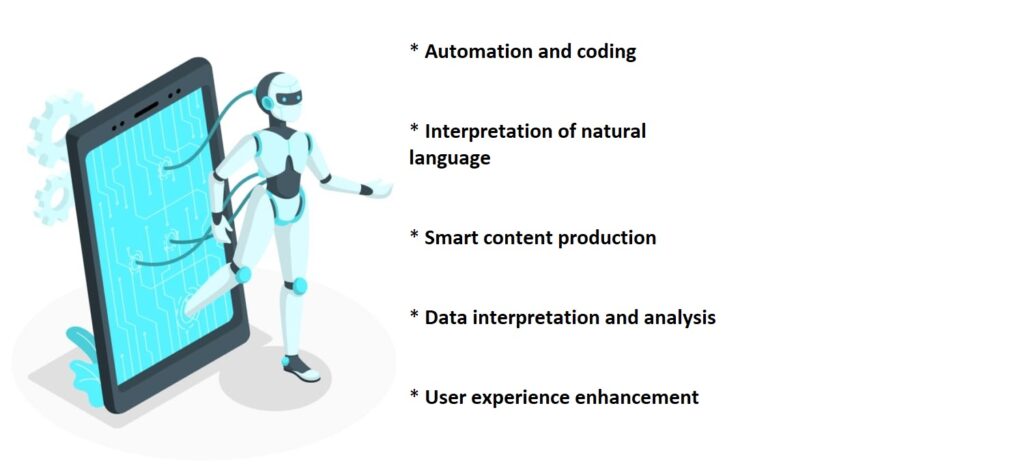
Table of Contents
What is AI ?
The ability of a computer to perform tasks that previously required human intelligence was initially referred to as “artificial intelligence” (AI) in the 1950s. Years of research and technological advancement have changed this extremely broad term.
The replication of human intelligence in robots designed to carry out tasks that normally require human intelligence is known as artificial intelligence or AI. Learning, reasoning, solving problems, perceiving, comprehending natural language, and adjusting to novel circumstances are some of these tasks.
Web development is continuously changing in today’s fast digital environment & AI is one of the biggest drivers of this evolution.
In web development, AI may save a great deal of time and effort by automating, locating, and resolving bugs. AI may even make code improvement recommendations in web development therefore, AI has countless applications in web development. In the field of web development, AI is capable of work automation, content generation, user experience optimization, natural language optimization & data analysis. AI has become a crucial component of the web development business, improving user experience & optimizing backend procedures.
Here we will explore the benefits & challenges of using AI in web development.
The Benefits Of AI in Web Development

1. Automation & Coding
AI and other automation technologies have the potential to automate about 45% of tasks carried out in a variety of industries, according to a McKinsey report.
To increase productivity and shorten development times, artificial intelligence (AI) may automate time-consuming and repetitive web development processes including creating code templates, refining layouts, and managing data.
AI effectively manages data management responsibilities and enhances data processing.
How automation and coding help web development
i. AI speeds up the development process by automating the creation and improvement.
ii. AI effectively manages data, enhancing data processing and analysis for web development projects.
iii. Developers can now focus more on their creative work because AI automates repetitive & time-consuming tasks.
2. Interpretation Of Natural Language
Interpretation of natural language makes it possible for chatbots and virtual assistants to understand user inquiries, reply & offer website customer service.
It improves user experience by providing correct responses.
How Interpretation Of Natural Language Helps Web Development
i. Interpretation of natural language makes it possible for automated customer service to respond to user requests in the correct manner.
ii. Instant website support is provided via chatbots & virtual assistants with interpretation of natural language.
iii. Interpretation of natural language algorithms allows systems to understand and interpret human language, thereby increasing communication and interaction.
3. Smart Content Production
AI-generated personalized content can significantly affect user engagement and conversation rates. For instance, according to Amazon, its recommendation engine – which employs AI algorithms to provide product recommendations based on user behavior and preferences – generates about 35% of the company’s overall sales.
AI personalizes user experiences by adjusting interface elements and content to suit each user’s preferences.
How smart content production helps web development
i. AI improves user experience & conversion rates by creating landing pages dynamically depending on user profiles and behavior.
ii. by customizing interface components and information to each user’s preferences, AI generates an individualized user experience.
iii. AI creates personalized content recommendations for increased user engagement by analyzing user behavior & interests.
4. Data Interpretation & Analysis
AI systems can extract useful insights from massive amounts of data by processing data from social media, user interactions, and website analytics.
To help website owners make data-driven decisions, Google Analytics, for instance, uses machine learning algorithms like Logistics Regression, Native Bayes, and Linear Regression to deliver real-time insights about their audience, traffic trends, and user behavior.
Businesses may make data-driven decisions and improve their web strategy by using these insights to better understand user behavior, and preferences, and make market trends.
How Data Interpretation & Analysis Helps Web Development
i. AI analyzes vast amounts of data to offer detailed reporting on website performance as well as advanced analytics.
ii. With the use of AI, organizations may better understand consumer performances and adjust their tactics by analyzing user interactions & behavior patterns.
iii. By identifying trends
5. User Experience Enhancements
AI is capable of analyzing user behavior, feedback, and interactions to improve content placement, navigation, and layout on websites.
Developers can create user interfaces that change and adapt in response to user choices by utilizing machine learning algorithms, which will result in more individualized and engaging user experiences.
How User Experience Enhancement Helps Web Development
i. AI uses user behavior analysis to improve user experience by optimizing website layouts & instantly adjusting interface elements.
ii. AI creates personalized and easy-to-use experience website layouts & navigation to user preferences.
iii. AI examines user activity data to find patterns & enhances user experience to increase interactions & conversion.
Challenges of AI in web development
As we already noted, there are many difficulties when integrating AI in web development.
Some are mentioned below.
- Updating and Maintenance: AI models need to get regular updates and maintenance to continue working well over time. this includes retraining models with new data, fine-tuning parameters, and adapting algorithms to changing requirements.
- Security Risks: AI systems are susceptible to various security vulnerabilities, including data breaches, adversarial attacks, and model poisoning. Ensuring the security of AI-powered web applications requires robust authentication, encryption, access control, and monitoring mechanisms.
- Skill Gap: It takes specific knowledge and abilities in fields like software engineering, data science, and machine learning to create AI-powered online applications.
- Data Quality and Quantity: Data is essential to the training and development of AI algorithms. It can be difficult to obtain substantial amounts of high-quality data, particularly for specialized or niche applications.
- Algorithm Selection: There are numerous AI algorithms and techniques available, each suited to different types of tasks and data. Choosing the most appropriate algorithm for a particular problem requires deep expertise and understanding of the strengths and limitations of various AI approaches.
- Performance Optimization: AI algorithms can require a lot of processing power, especially when working with big data sets. Optimizing the performance of AI-powered web applications requires careful attention to factors such as processing speed, memory usage, and scalability.
- Integration Complexity: Integrating AI capabilities into web applications often involves working with multiple technologies, frameworks, and APIs. Coordinating these components and ensuring seamless interoperability can be challenging, especially for developers with limited experience in AI.
Conclusion
The integration of artificial intelligence (AI) into web development represents a significant advancement in technology, offering a lot of benefits while also posing certain challenges through task automation, enhanced data analytic capabilities, and improved user experience, AI has completely changed web development.
From automated coding to intelligent content generation and data interpretation and analysis to user experience enhancements, AI has opened up new possibilities for creating dynamic and engaging web experiences.
However, it also comes with challenges related to security risk, skill gaps, algorithm selection, integration compatibility, data quality and quantity, and performance optimization Despite these challenges, the potential of AI in web development remains immense.